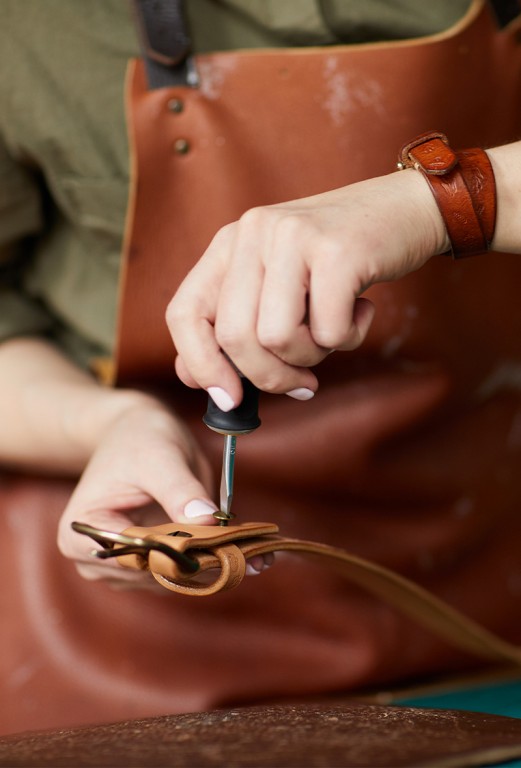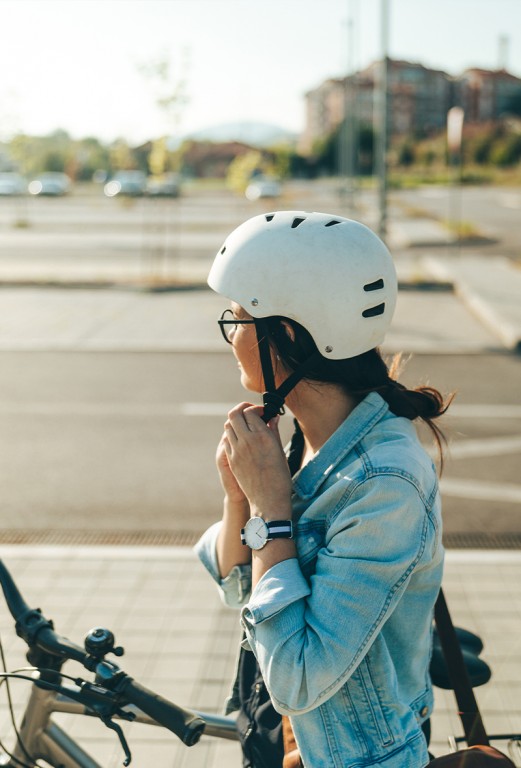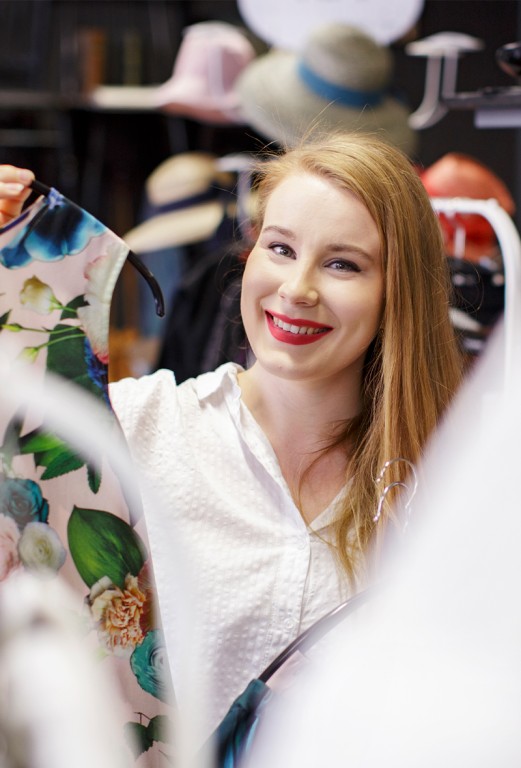6 Important Things You Should Know About the Fair Change Programme
Due to climate change, it is imperative to reduce emissions rapidly. The Fair Change programme is the Greens’ response to how Finland will achieve carbon neutrality by 2035. Iiris Suomela, Member of Parliament and leader of the Fair Change working group, explains how the change will affect our daily lives – transport, consumption and even food – and how it will succeed without the less fortunate being left behind and without compromises in our quality of life.
1. The end of the disposable culture
One of the principles of the Greens’ Fair Change programme is that products must be made to withstand consumption and must be repairable.
It is not fair to force people to buy something new just to increase consumption. More repair and maintenance services are needed, for example for clothes and household appliances.
“We want an end to disposable products. It is preposterous that some mobile phone batteries cannot be replaced without almost completely dismantling the phone,” says Iiris Suomela, a Green MP and leader of the Fair Change working group.
Nowadays, buying a new product is often cheaper than repairing an old one. One reason for this is that repair workers in Finland are allowed decent working conditions, while virgin raw materials are often produced in countries where working conditions are poor and human rights are not respected. Production of raw materials is often associated with serious environmental damage.
Raw materials must therefore be used for as long as possible and their recycling for new purposes must be made more efficient and easier.
Green goal: Comprehensive “Right to repair” regulation regarding device repairability would promote the circular economy and create jobs. So would more-intensive recycling of textiles, electronic waste, plastics and building materials.
2. Sustainable choices made easy and cheaper
Fair change aims to stop climate change and to achieve a carbon neutral Finland by 2035.

Because this would also entail changes in everyday life, it is important that the most vulnerable do not have to suffer and pay the price.
The aim of the Fair Change programme is to combat climate change, poverty and inequality at the same time.
Iiris Suomela was happy to note that the actions presented in the programme have been green policies since the early 1980s.
A craftsman repairs a leather belt. “Since then, the Greens have supported a universal basic income and environmental taxes, for example, in contrast to traditional economic thinking. Osmo Soininvaara was writing about a range of fair change measures back then.”
One of the key goals of fair change is to enable increasing numbers of Finns to make sustainable and ethical choices in their daily lives. It is currently difficult or even impossible to distinguish such products in shops.
“No one should have to wonder whether they are accidentally buying products produced by child labour.”
A climate-friendly option should always be cheaper than a polluting one. This means, for example, that pulled oats should cost less than minced meat, as CO2 emissions from meat production are many times higher than from vegetable production.
A huge challenge lies ahead: if implemented, the proposals for action in the Fair Change programme would revolutionise the logic of the entire economic system. In contrast, the current goal is continuous growth, which in turn requires a continuous increase in consumption.
“We must leave this behind and move to reasonable consumption of resources everywhere.”
Green goal: To develop product labelling and advertising legislation enabling consumers to choose sustainable products. The Corporate Responsibility Act should oblige companies to comply with minimum criteria for sustainable operations.
3. Green options for transport

Most of Finland’s climate emissions are caused by eating, travelling and living. Transport accounts for one third of our overall carbon footprint, and the same amount is generated by housing and the associated use of energy. Food and drink account for one fifth of the carbon footprint.
These themes must be addressed. The Greens want everyday changes to be fair. It must be understood that people’s daily lives are very different in different parts of Finland.
A cyclist puts on a helmet. Fairness means, for example, that a pensioner in a small house should not have to pay for energy saving renovations, even though homes can no longer be heated with fossil oil. And that you do not have to give up your car if distances are long and there are no other options.
“The number of cars needs to be reduced because the number of electric and biogas cars cannot possibly be increased quickly enough. Few people drive just for fun, but do so for reasons such as urgency or convenience. There must be better options available for them.”
In Finland, most car rides are less than 10 kilometres long and occur in urban areas. The Greens believe that there is room for reduction here. Of course, cycling must be increased. However, the best way to reduce motoring is to develop public transport, especially low-emission rail transport.
“Ticket prices must be reduced and solutions created that make everyday life smoother. People don’t take the subway primarily because it’s sustainable, but because it’s fast and convenient.”
It should be possible to travel between cities and countries by train. So money, such as that obtained from a possible air tax, should be directed towards the development of rail connections.
Levying an air tax is a key principle of the Fair Change programme: the polluter pays. Increasing emissions should be heavy on the wallet. An air tax would lead to higher airfares which, for some Finns, would mean not having enough money to travel by air as they used to.
“From a climate perspective, there should be fewer flights. Long-distance travel is already a luxury and not everyone can afford it. Long-haul flights will not end, but emissions must be reflected in flight prices. Flying is barely taxed at all.”
Green goal: Commuting deductions and mileage allowances independent of mode of transport, as well as compensation for walking and cycling.
4. Low-income people are compensated for the additional costs caused by the change
Fairness also means maintaining favourable living conditions throughout Finland. For example, in areas with long distances and poor transport connections, people will continue to drive diesel or petrol cars. Not everyone can afford an electric car, but the ecological option could be enabled for more people by continuing to support the purchase of electric cars and providing support for biogas and ethanol conversion, and by introducing a scrapping premium. Use of fossil fuels must be reduced, above all in cities.
Petrol and diesel taxes must be raised, but additional costs can be offset in areas where there are few alternatives to motoring.
“One way of implementing compensation would be a regional addition to the carbon dividend,” says Suomela.
Through a carbon dividend, income collected through environmental taxes would be distributed to Finns as dividends. This could be based on the principles of the Greens’ basic income model, whereby progressive taxation is used to deduct the dividend automatically from people with the highest incomes.
Regional compensation would mean that, in sparsely populated areas, for example, those affected by petrol and diesel taxes would receive a higher carbon dividend.
The logic of fair change includes the state supporting owners of detached houses when they convert from oil boilers to more climate-friendly heating methods such as geothermal heat.
Many practical means of combatting climate change mean additional costs, hitting low-income people the hardest. This would not be fair. That is why the Greens want to improve social security, reduce taxation of small incomes, and move from taxation of work to the taxation of environmental damage and ownership.
An important part of fair change and an important way to support employment would be a basic income, a kind of national salary that every Finn would receive unconditionally. A basic income would provide security for people such as low-paid workers, freelancers and temporary and part-time workers.
“The current social security system consists of dozens of benefits with waiting times, conditions and restrictions. Due to the system’s fragmentation, an unfortunately high number of people fall through the holes in the safety net. It is not always worth working or running a business, because even a small income can lead to the loss of all social security,” Suomela explains.
A basic income would bring flexibility to different life situations and help people adapt to change. For example, during the coronavirus restrictions, a basic income would have guaranteed an income for many who saw a halt or reduction in their livelihoods.
“Similarly, it would always make sense for an unemployed person to take a job, as the basic income would only gradually decrease as their earnings became sufficient.”
Green goal: An equal carbon dividend for all will offset the increase in emissions taxes. In this way, those who consume less and behave more sustainably would benefit more in the long term. An EU-wide citizens’ initiative is underway on carbon dividends and carbon taxes.
Green goal: A basic income and tax relief for low-income earners will offset the additional costs of environmental taxes. Correspondingly, capital taxation will be raised, and a wealth tax will be introduced.
5. Individual responsibility and political decisions
“People have already died as a result of disasters caused by climate change. Desertification poses a threat not only to African but also southern European agriculture. Devastating forest fires have become more common, of which last year’s fires in Sweden and Australia were a tragic example,” Suomela lists.
She points out that the less fortunate are hit hardest by both climate change and means of combating it. Suomela gives an example: when the sea level rises, some people may lose their homes. When a job based on fossil raw materials disappears, new jobs may not be found in the immediate area. Moving elsewhere is not easy for people with insufficient money for a rent deposit, let alone a mortgage.
According to surveys, Finns want to take action to stop climate change. A survey by Sitra found that 69 per cent of the respondents believed that consumer choices matter, and 79 per cent considered sustainable living important.
The snow-free winter in Southern Finland served as a recent wake-up call. Flood risks have grown due to the increase in heavy rains, mild winters and rises in global sea levels in many regions. Even in Helsinki, large areas may be submerged.
However, sustainable choices by individual consumers will not be enough to stop climate change. Policy decisions are needed to guide production and consumption through regulation and taxation, for example.
“The changes will apply to everyone, but implementation should not be left to individuals. People’s choices are greatly influenced by the structures, culture and habits of a society, and can be guided in a more sustainable direction by political choices,” says Suomela.
Green goal: When emissions trading is restructured and environmentally harmful subsidies and tax breaks removed, it will be more profitable for companies to switch to lower-emission production.
Green goal: Higher carbon taxes will lead to lower-emission choices. The same is true of EU-wide carbon tariffs on all non-ETS goods from outside the EU.
6. Managed change for better quality of life

Many discussions of climate change list only those things that will become more expensive or must be abandoned. Perhaps the biggest goal of fair change involves everyone having to rethink their way of life: does wellbeing equal consumption?
The Fair Change working group does not think so. Many factors contributing to quality of life place no strain on the climate at all – and would not necessarily cost much. In a fair, climate-friendly society, many things would certainly increase in price, but you would not have to buy everything for yourself. There is also a need to develop services that increase wellbeing.
“Clothing rental services are a good example of this. In the future, t-shirts that cost five euros will no longer exist. A clothing rental service could provide you with a new dress every week for the price of just two purchased dresses. For me, at least, this would represent a considerable improvement in quality of life,” says Suomela.
There are many other good examples of this. You can sell your used dinnerware to Iittala and Arabia’s Vintage service, instead of placing it in mixed waste. The Kyyti app combines public transport and private business mobility services in the same service.
Why can’t quality of life be treated as a similar measure to GDP? In line with the goals of the Fair Change programme, it should be raised alongside GDP as lifestyles are guided in a more sustainable direction.
According to Suomela, if we want to stop global warming at 1.5 degrees, we must cut emissions so hard and fast that everyone will be involved in the related work and decision-making. If the coronavirus taught us anything, it is that Finns are capable of change and clever at developing new ideas.
“It is the task of political leadership to accelerate change through regulation and economic policy reform. Ultimately, however, change will occur in everyday life: in workplaces, grocery shops, petrol stations and other situations where people make choices,” says Iiris Suomela.
Green goal: The voting age should be 16, as young people must live longest with the consequences of decisions made now.
text: Sanna Sevänen
pictures of Iiris Suomela: Maija Astikainen
 Vihreät - De Gröna
Vihreät - De Gröna